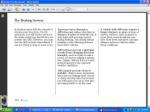civic official manual

No! From early commercials, it may have looked like you could stop on a dime. That instantaneous stop is not realistic. When braking on dry or wet roads your stopping distance will be about the same as with conventional brakes.
You should allow for a longer stopping distance with ABS than for conventional brakes when driving on gravel, slush, and snow. This is because the rotating tire will stay on top of this low traction road surface covering, and effectively "float" on this boundary layer.
A non ABS braked vehicle can lock its tires and create a snow plow effect in front of the tires which helps slow the vehicle. These locked tires can often find more traction below this boundary layer
http://www.turknorthamerica.com/Kose_Yazilari-op-printpage-artid-4.html
A number of factors can affect braking distance: road conditions, tire wear, brake conditions, and driver's reaction time. Because there is a high friction ratio between tire and road on rough and dry pavement, there won't be much of a difference in braking distance whether using ABS or not. But on ice, unless you are an expert driver who can pump the brakes as efficiently as an ABS system, the antilock will greatly improve braking. Also when the front wheels lock on a slippery surface the vehicle will keep going in a straight line even if you try to swing the wheels, thus losing control. But the ABS system allows the wheels to keep turning. It is possible to maneuver to avoid a collision even on the ice.
http://www.urbandictionary.com/define.php?term=A.B.S
if now u shitty fans dont agree then their is no point of argument...
i know nothing is going to pass into your thick skull narrow mind...
paindon kuch man bhi lya karo apni bongia na martay raha karo.....
people who have designed ABS are saying these thing...laken asa lagta ha tujay kuch ziada pata ha.....
peace out!!!!!
